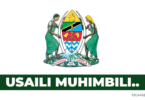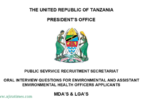Securing a position as a Clinical Officer is a significant milestone in the medical field. After the written exams and practical tests, the oral interview stands as the final hurdle. Clinical Officer Oral Interview Questions and Answers This article provides an overview of common clinical officer oral interview questions and offers strategies on how to answer them effectively.
1. Tell Us About Yourself
This is a standard opening question in many interviews. The interviewers want to understand your background, education, and professional journey.
How to Answer:
Focus on your education, relevant experience, and personal attributes that make you suitable for the role. Keep it concise and relevant. For example:
“I am a trained Clinical Officer with a diploma in Clinical Medicine from [Your College]. Over the past three years, I have worked in [Hospital/Clinic Name], where I gained hands-on experience in diagnosing and treating a wide range of conditions. I am passionate about patient care and have developed strong skills in managing both acute and chronic cases.”
2. Why Do You Want to Work Here?
This question tests your knowledge of the institution and your motivation for joining.
How to Answer:
Research the facility before the interview and identify what makes it unique. Link the institution’s values, reputation, or specific programs to your career goals.
“I am impressed by [Hospital/Clinic Name]’s commitment to community health, particularly its outreach programs for underserved populations. I believe that my skills and experience align well with your mission, and I am eager to contribute to your team while continuing to grow professionally.”
3. Describe a Challenging Case You Handled and How You Managed It.
This question assesses your problem-solving skills and ability to work under pressure.
How to Answer:
Choose a specific case where you played a key role. Describe the situation, your approach, and the outcome. Highlight your critical thinking and teamwork.
“While working in the emergency department, I encountered a patient with severe abdominal pain. After conducting a thorough examination and considering the symptoms, I suspected an ectopic pregnancy. I quickly coordinated with the surgical team, and the patient was successfully treated. This experience reinforced the importance of timely diagnosis and effective communication in critical situations.”
4. How Do You Stay Updated with Medical Advancements?
Continuous learning is essential in the medical field, and this question explores your commitment to professional development.
How to Answer:
Mention any courses, workshops, or conferences you have attended. Also, include reading medical journals, participating in online forums, or being a member of professional bodies.
“I regularly attend medical workshops and have completed several online courses on emerging medical technologies. Additionally, I am a member of the [Professional Association], which provides access to the latest research and case studies in clinical practice.”
5. How Would You Handle a Difficult Patient or Family Member?
Interpersonal skills are crucial in healthcare. This question evaluates your ability to manage challenging interactions.
How to Answer:
Emphasize empathy, patience, and communication. Provide an example if possible.
“In my previous role, I encountered a patient’s family who was very anxious about the treatment process. I took the time to listen to their concerns, explained the procedure in detail, and reassured them of the care we would provide. By remaining calm and empathetic, I was able to alleviate their worries and maintain a positive relationship.”
6. What Are Your Strengths and Weaknesses as a Clinical Officer?
This question tests your self-awareness and honesty.
How to Answer:
When discussing strengths, focus on qualities that are relevant to the role. For weaknesses, choose something that you have made efforts to improve.
“My strengths include excellent diagnostic skills and a strong ability to work under pressure. I have also been commended for my teamwork and communication. As for weaknesses, I used to struggle with delegating tasks, but I have been working on this by actively involving others in patient management and trusting my colleagues’ expertise.”
7. How Do You Ensure Patient Confidentiality?
Patient confidentiality is a critical aspect of healthcare practice.
How to Answer:
Discuss your understanding of confidentiality laws and practices, and provide examples of how you implement them.
“I ensure patient confidentiality by strictly adhering to the guidelines of the [Medical Ethics Board/Act]. I make sure that patient records are securely stored, and information is only shared with authorized personnel. In situations where discussions are necessary, I ensure they take place in private settings.”
8. Why Should We Hire You?
This is your chance to make a strong final impression.
How to Answer:
Summarize your qualifications, experience, and enthusiasm for the role. Make it clear why you are the best fit.
“My training, hands-on experience, and passion for patient care make me an excellent fit for this role. I am committed to providing high-quality care and continuously improving my skills. I am confident that I can contribute positively to your team and help advance the excellent reputation of [Hospital/Clinic Name].”
Preparing for a clinical officer oral interview requires not only understanding the medical aspects of the role but also being ready to showcase your interpersonal skills, problem-solving abilities, and commitment to the profession. By anticipating these common questions and formulating thoughtful responses, you can approach your interview with confidence.
For more insights and guidance on preparing for your clinical officer interviews, visit AjiraTimes and explore our wide range of career resources.
READ ALSO: Environmental Health Officer and Assistant Interviews Qs & As





